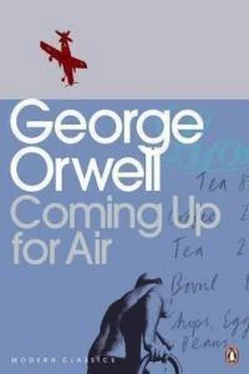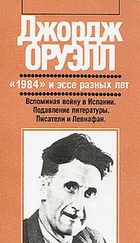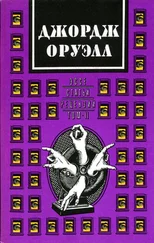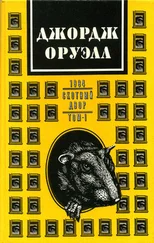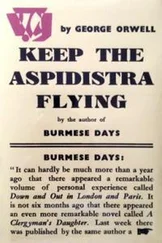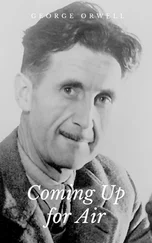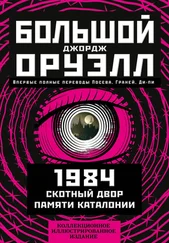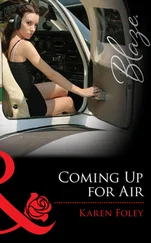Джордж Оруэлл - Coming Up For Air
Здесь есть возможность читать онлайн «Джордж Оруэлл - Coming Up For Air» — ознакомительный отрывок электронной книги совершенно бесплатно, а после прочтения отрывка купить полную версию. В некоторых случаях можно слушать аудио, скачать через торрент в формате fb2 и присутствует краткое содержание. Год выпуска: 2014, Издательство: epubBooks Classics, Жанр: Классическая проза, на английском языке. Описание произведения, (предисловие) а так же отзывы посетителей доступны на портале библиотеки ЛибКат.
- Название:Coming Up For Air
- Автор:
- Издательство:epubBooks Classics
- Жанр:
- Год:2014
- ISBN:нет данных
- Рейтинг книги:3 / 5. Голосов: 1
-
Избранное:Добавить в избранное
- Отзывы:
-
Ваша оценка:
- 60
- 1
- 2
- 3
- 4
- 5
Coming Up For Air: краткое содержание, описание и аннотация
Предлагаем к чтению аннотацию, описание, краткое содержание или предисловие (зависит от того, что написал сам автор книги «Coming Up For Air»). Если вы не нашли необходимую информацию о книге — напишите в комментариях, мы постараемся отыскать её.
Coming Up For Air — читать онлайн ознакомительный отрывок
Ниже представлен текст книги, разбитый по страницам. Система сохранения места последней прочитанной страницы, позволяет с удобством читать онлайн бесплатно книгу «Coming Up For Air», без необходимости каждый раз заново искать на чём Вы остановились. Поставьте закладку, и сможете в любой момент перейти на страницу, на которой закончили чтение.
Интервал:
Закладка:
Poor Katie! She had her first baby when she was fifteen. No one knew who was the father, and probably Katie wasn't too certain herself. Most people believe it was one of her brothers. The workhouse people took the baby, and Katie went into service in Walton. Some time afterwards she married a tinker, which even by the standards of her family was a come–down. The last time I saw her was in 1913. I was biking through Walton, and I passed some dreadful wooden shacks beside the railway line, with fences round them made out of barrel–staves, where the gypsies used to camp at certain times of the year, when the police would let them. A wrinkled–up hag of a woman, with her hair coming down and a smoky face, looking at least fifty years old, came out of one of the huts and began shaking out a rag mat. It was Katie, who must have been twenty–seven.
2
Thursday was market day. Chaps with round red faces like pumpkins and dirty smocks and huge boots covered with dry cow–dung, carrying long hazel switches, used to drive their brutes into the market– place early in the morning. For hours there'd be a terrific hullabaloo: dogs barking, pigs squealing, chaps in tradesmen's vans who wanted to get through the crush cracking their whips and cursing, and everyone who had anything to do with the cattle shouting and throwing sticks. The big noise was always when they brought a bull to market. Even at that age it struck me that most of the bulls were harmless law–abiding brutes that only wanted to get to their stalls in peace, but a bull wouldn't have been regarded as a bull if half the town hadn't had to turn out and chase it. Sometimes some terrified brute, generally a half–grown heifer, used to break loose and charge down a side street, and then anyone who happened to be in the way would stand in the middle of the road and swing his arms backwards like the sails of a windmill, shouting, 'Woo! Woo!' This was supposed to have a kind of hypnotic effect on an animal and certainly it did frighten them.
Half–way through the morning some of the farmers would come into the shop and run samples of seed through their fingers. Actually Father did very little business with the farmers, because he had no delivery van and couldn't afford to give long credits. Mostly he did a rather petty class of business, poultry food and fodder for the tradesmen's horses and so forth. Old Brewer, of the Mill Farm, who was a stingy old bastard with a grey chin–beard, used to stand there for half an hour, fingering samples of chicken corn and letting them drop into his pocket in an absent–minded manner, after which, of course, he finally used to make off without buying anything. In the evenings the pubs were full of drunken men. In those days beer cost twopence a pint, and unlike the beer nowadays it had some guts in it. All through the Boer War the recruiting sergeant used to be in the four–ale bar of the George every Thursday and Saturday night, dressed up to the nines and very free with his money. Sometimes next morning you'd see him leading off some great sheepish, red–faced lump of a farm lad who'd taken the shilling when he was too drunk to see and found in the morning that it would cost him twenty pounds to get out of it. People used to stand in their doorways and shake their heads when they saw them go past, almost as if it had been a funeral. 'Well now! Listed for a soldier! Just think of it! A fine young fellow like that!' It just shocked them. Listing for a soldier, in their eyes, was the exact equivalent of a girl's going on the streets. Their attitude to the war, and to the Army, was very curious. They had the good old English notions that the red–coats are the scum of the earth and anyone who joins the Army will die of drink and go straight to hell, but at the same time they were good patriots, stuck Union Jacks in their windows, and held it as an article of faith that the English had never been beaten in battle and never could be. At that time everyone, even the Nonconformists, used to sing sentimental songs about the thin red line and the soldier boy who died on the battlefield far away. These soldier boys always used to die 'when the shot and shell were flying', I remember. It puzzled me as a kid. Shot I could understand, but it produced a queer picture in my mind to think of cockle–shells flying through the air. When Mafeking was relieved the people nearly yelled the roof off, and there were at any rate times when they believed the tales about the Boers chucking babies into the air and skewering them on their bayonets. Old Brewer got so fed up with the kids yelling 'Krooger!' after him that towards the end of the war he shaved his beard off. The people's attitude towards the Government was really the same. They were all true–blue Englishmen and swore that Vicky was the best queen that ever lived and foreigners were dirt, but at the same time nobody ever thought of paying a tax, not even a dog–licence, if there was any way of dodging it.
Before and after the war Lower Binfield was a Liberal constituency. During the war there was a by–election which the Conservatives won. I was too young to grasp what it was all about, I only knew that I was a Conservative because I liked the blue streamers better than the red ones, and I chiefly remember it because of a drunken man who fell on his nose on the pavement outside the George. In the general excitement nobody took any notice of him, and he lay there for hours in the hot sun with his blood drying round him, and when it dried it was purple. By the time the 1906 election came along I was old enough to understand it, more or less, and this time I was a Liberal because everybody else was. The people chased the Conservative candidate half a mile and threw him into a pond full of duckweed. People took politics seriously in those days. They used to begin storing up rotten eggs weeks before an election.
Very early in life, when the Boer War broke out, I remember the big row between Father and Uncle Ezekiel. Uncle Ezekiel had a little boot–shop in one of the streets off the High Street, and also did some cobbling. It was a small business and tended to get smaller, which didn't matter greatly because Uncle Ezekiel wasn't married. He was only a half–brother and much older than Father, twenty years older at least, and for the fifteen years or so that I knew him he always looked exactly the same. He was a fine–looking old chap, rather tall, with white hair and the whitest whiskers I ever saw— white as thistledown. He had a way of slapping his leather apron and standing up very straight—a reaction from bending over the last, I suppose—after which he'd bark his opinions straight in your face, ending up with a sort of ghostly cackle. He was a real old nineteenth–century Liberal, the kind that not only used to ask you what Gladstone said in '78 but could tell you the answer, and one of the very few people in Lower Binfield who stuck to the same opinions all through the war. He was always denouncing Joe Chamberlain and some gang of people that he referred to as 'the Park Lane riff–raff'. I can hear him now, having one of his arguments with Father. 'Them and their far–flung Empire! Can't fling it too far for me. He–he–he!' And then Father's voice, a quiet, worried, conscientious kind of voice, coming back at him with the white man's burden and our dooty to the pore blacks whom these here Boars treated something shameful. For a week or so after Uncle Ezekiel gave it out that he was a pro–Boer and a Little Englander they were hardly on speaking terms. They had another row when the atrocity stories started. Father was very worried by the tales he'd heard, and he tackled Uncle Ezekiel about it. Little Englander or no, surely he couldn't think it right for these here Boars to throw babies in the air and catch them on their bayonets, even if they WERE only nigger babies? But Uncle Ezekiel just laughed in his face. Father had got it all wrong! It wasn't the Boars who threw babies in the air, it was the British soldiers! He kept grabbing hold of me—I must have been about five—to illustrate. 'Throw them in the air and skewer them like frogs, I tell you! Same as I might throw this youngster here!' And then he'd swing me up and almost let go of me, and I had a vivid picture of myself flying through the air and landing plonk on the end of a bayonet.
Читать дальшеИнтервал:
Закладка:
Похожие книги на «Coming Up For Air»
Представляем Вашему вниманию похожие книги на «Coming Up For Air» списком для выбора. Мы отобрали схожую по названию и смыслу литературу в надежде предоставить читателям больше вариантов отыскать новые, интересные, ещё непрочитанные произведения.
Обсуждение, отзывы о книге «Coming Up For Air» и просто собственные мнения читателей. Оставьте ваши комментарии, напишите, что Вы думаете о произведении, его смысле или главных героях. Укажите что конкретно понравилось, а что нет, и почему Вы так считаете.
